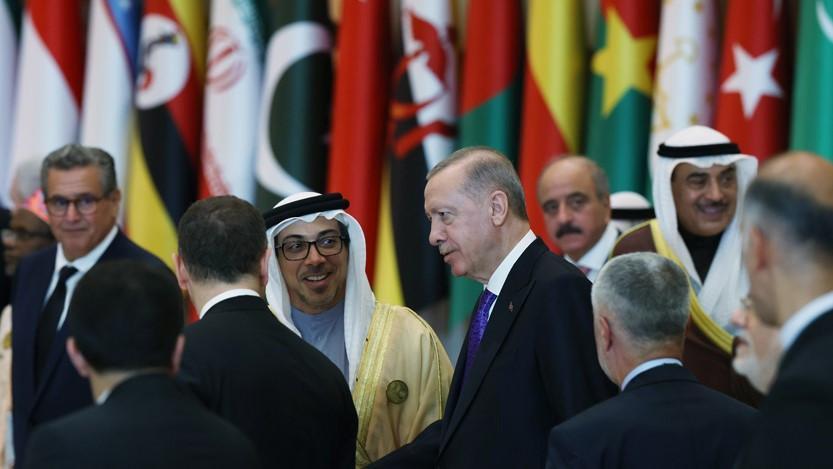
President Recep Tayyip Erdoğan has urged Muslim countries to spearhead sanctions against Israel as the conflict in the Middle East escalates.
"It is extremely important to impose an arms embargo on Israel and end trade," Erdoğan told a joint summit of the Arab League and the Organization of Islamic Cooperation (OIC) in Riyadh on Nov. 11.
The gathering drew leaders from across the Arab and Islamic worlds to address rising tensions across the Middle East and discuss collaborative efforts for stabilizing the region.
Erdoğan stressed the urgency of achieving a ceasefire and delivering humanitarian aid to Gaza, calling Israel’s actions in the area "genocide."
"While a handful of Western countries provide all kinds of support, the inadequacy of Muslim countries in reacting has unfortunately led to the situation on the field reaching this point," he said.
“We cannot allow the differences of opinion and attitude among us to become an obstacle to our common cause."
Erdoğan was accompanied by his chief foreign policy advisor Akif Çağatay Kılıç, Energy and Natural Resources Minister Alparslan Bayraktar and National Intelligence Organization (MİT) head İbrahim Kalın.
On the sidelines of the summit, Erdoğan was expected to hold a series of bilateral talks with other leaders, focusing on measures to address ongoing conflicts and promote peace.
The gathering follows a meeting in Riyadh in late October, during which the Saudi Foreign Ministry announced the formation of an "international alliance" aimed at advancing efforts toward the establishment of a Palestinian state.
It comes one year after a similar gathering in Riyadh of the Arab League and the OIC during which leaders condemned the actions of the Israeli forces in Gaza as "barbaric."
Despite criticism of the impact Israel's military campaign has had on Gaza civilians, outgoing U.S. President Joe Biden ensured that Washington remained Israel's most important military backer during more than a year of fighting.
In his first term, the president-elect Donald Trump's actions showed him as an even firmer supporter of Israel. He defied international consensus by recognizing Jerusalem as Israel's capital and moving Washington's embassy there.
He also endorsed Israeli settlements in the occupied West Bank, which are illegal under international law.
Under the Abraham Accords, Trump oversaw the establishment of diplomatic relations between Israel, the United Arab Emirates and Bahrain, as well as Morocco.
Although Saudi Arabia did not join those agreements, Trump cultivated warm ties with the Gulf kingdom while in office and has deepened his business connections to the region during the Biden years.
Saudi Arabia has pressed pause on a U.S.-brokered deal where it would recognize Israel in return for security and economic benefits, insisting there will be no diplomatic ties without a Palestinian state.
The 57-member OIC and 22-member Arab League include countries which recognize Israel and those firmly opposed to its regional integration.
Last year's summit in Riyadh saw disagreement on measures like severing economic and diplomatic ties with Israel and disrupting its oil supplies.
The November 2023 meeting featured an appearance by Iran's then-president Ebrahim Raisi, highlighting how regional diplomacy has changed since Trump was last in office.